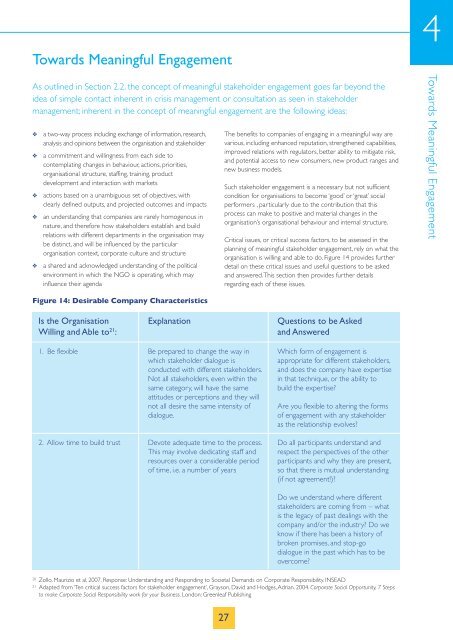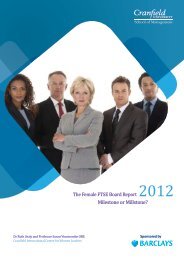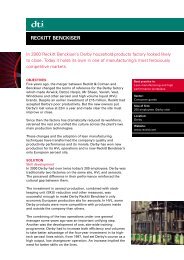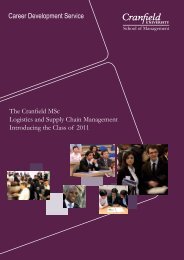Stakeholder Engagement - Cranfield School of Management ...
Stakeholder Engagement - Cranfield School of Management ...
Stakeholder Engagement - Cranfield School of Management ...
Create successful ePaper yourself
Turn your PDF publications into a flip-book with our unique Google optimized e-Paper software.
Towards Meaningful <strong>Engagement</strong><br />
As outlined in Section 2.2, the concept <strong>of</strong> meaningful stakeholder engagement goes far beyond the<br />
idea <strong>of</strong> simple contact inherent in crisis management or consultation as seen in stakeholder<br />
management; inherent in the concept <strong>of</strong> meaningful engagement are the following ideas:<br />
❖ a two-way process including exchange <strong>of</strong> information, research,<br />
analysis and opinions between the organisation and stakeholder<br />
❖ a commitment and willingness from each side to<br />
contemplating changes in behaviour, actions, priorities,<br />
organisational structure, staffing, training, product<br />
development and interaction with markets<br />
❖ actions based on a unambiguous set <strong>of</strong> objectives, with<br />
clearly defined outputs, and projected outcomes and impacts<br />
❖ an understanding that companies are rarely homogenous in<br />
nature, and therefore how stakeholders establish and build<br />
relations with different departments in the organisation may<br />
be distinct, and will be influenced by the particular<br />
organisation context, corporate culture and structure<br />
❖ a shared and acknowledged understanding <strong>of</strong> the political<br />
environment in which the NGO is operating, which may<br />
influence their agenda<br />
Figure 14: Desirable Company Characteristics<br />
The benefits to companies <strong>of</strong> engaging in a meaningful way are<br />
various, including enhanced reputation, strengthened capabilities,<br />
improved relations with regulators, better ability to mitigate risk,<br />
and potential access to new consumers, new product ranges and<br />
new business models.<br />
Such stakeholder engagement is a necessary but not sufficient<br />
condition for organisations to become ‘good’ or ‘great’ social<br />
performers , particularly due to the contribution that this<br />
process can make to positive and material changes in the<br />
organisation’s organisational behaviour and internal structure.<br />
Critical issues, or critical success factors, to be assessed in the<br />
planning <strong>of</strong> meaningful stakeholder engagement, rely on what the<br />
organisation is willing and able to do. Figure 14 provides further<br />
detail on these critical issues and useful questions to be asked<br />
and answered.This section then provides further details<br />
regarding each <strong>of</strong> these issues.<br />
Is the Organisation Explanation Questions to be Asked<br />
Willing and Able to 21 : and Answered<br />
1. Be flexible Be prepared to change the way in Which form <strong>of</strong> engagement is<br />
which stakeholder dialogue is appropriate for different stakeholders,<br />
conducted with different stakeholders. and does the company have expertise<br />
Not all stakeholders, even within the in that technique, or the ability to<br />
same category, will have the same build the expertise?<br />
attitudes or perceptions and they will<br />
not all desire the same intensity <strong>of</strong> Are you flexible to altering the forms<br />
dialogue. <strong>of</strong> engagement with any stakeholder<br />
as the relationship evolves?<br />
2. Allow time to build trust Devote adequate time to the process. Do all participants understand and<br />
This may involve dedicating staff and respect the perspectives <strong>of</strong> the other<br />
resources over a considerable period participants and why they are present,<br />
<strong>of</strong> time, i.e. a number <strong>of</strong> years so that there is mutual understanding<br />
(if not agreement!)?<br />
20 Zollo, Maurizio et al, 2007. Response: Understanding and Responding to Societal Demands on Corporate Responsibility. INSEAD<br />
21 Adapted from ‘Ten critical success factors for stakeholder engagement’, Grayson, David and Hodges, Adrian. 2004. Corporate Social Opportunity, 7 Steps<br />
to make Corporate Social Responsibility work for your Business. London: Greenleaf Publishing<br />
27<br />
Do we understand where different<br />
stakeholders are coming from – what<br />
is the legacy <strong>of</strong> past dealings with the<br />
company and/or the industry? Do we<br />
know if there has been a history <strong>of</strong><br />
broken promises, and stop-go<br />
dialogue in the past which has to be<br />
overcome?<br />
4<br />
Towards Meaningful <strong>Engagement</strong>
















